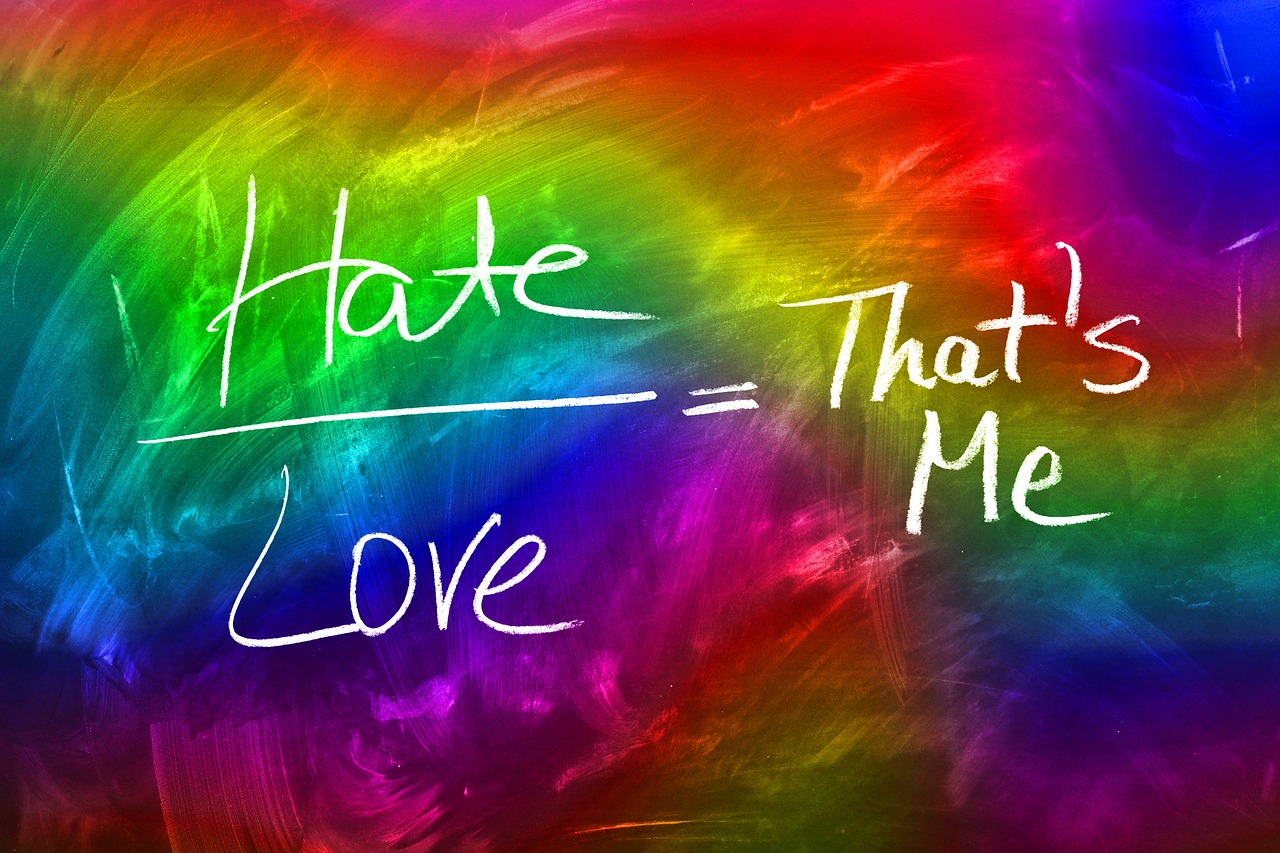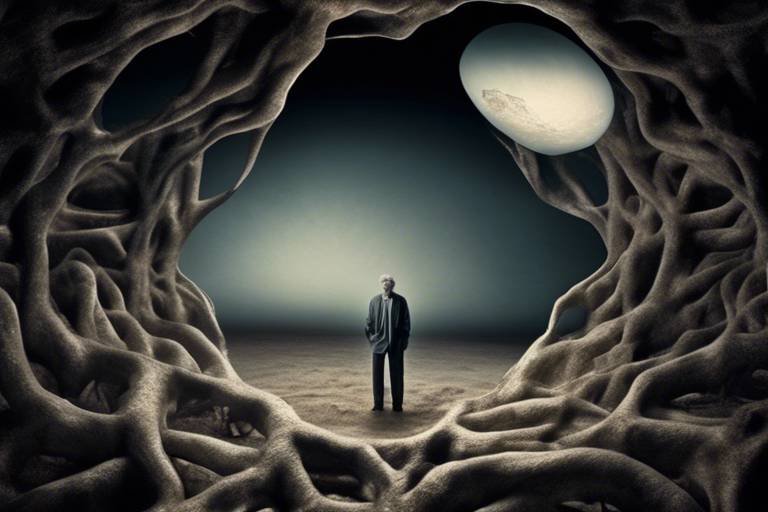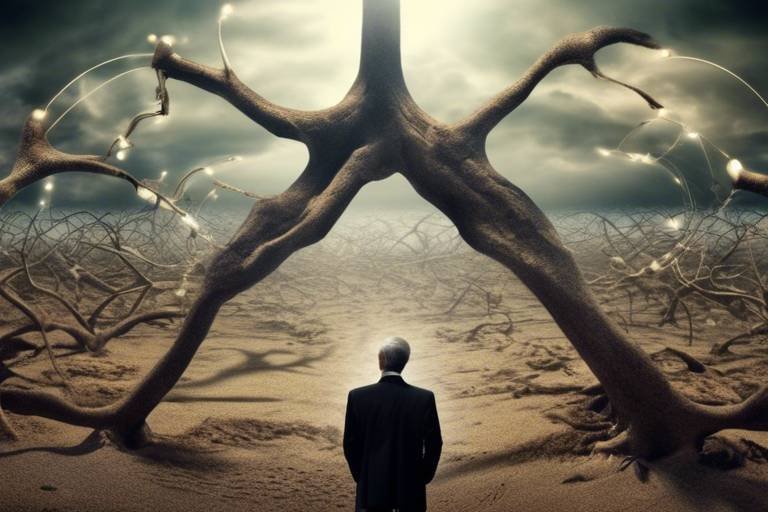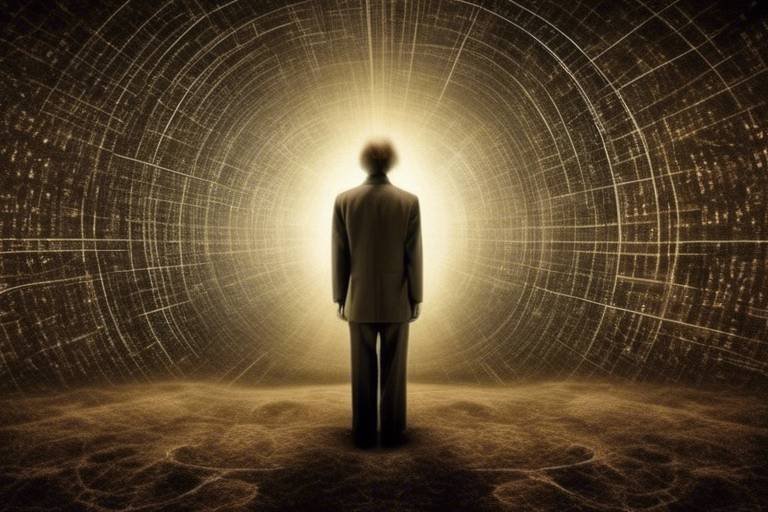Does Ontology Answer the Mystery of Existence?
Have you ever pondered the big questions of life? You know, the ones that make you stare at the ceiling at 2 a.m.? What is existence? Why are we here? These profound questions have puzzled humanity for centuries, and one philosophical discipline that dives deep into these mysteries is ontology. But does ontology truly provide answers, or does it merely add layers to the enigma of existence? In this article, we will embark on a journey through the realm of ontology, exploring its significance, historical roots, and contemporary implications. Buckle up, because this exploration is going to be both enlightening and, dare I say, a little mind-bending!
At its core, ontology is the study of being—the very essence of existence itself. It investigates what entities exist, how they are categorized, and what it means to be. Imagine ontology as a vast library filled with books on every conceivable aspect of existence, where each book represents a different entity or concept. Just like a librarian organizes books into sections, ontology helps us organize our understanding of reality. The questions it raises are not just academic; they resonate deeply with our lived experiences, prompting us to reflect on our place in the universe.
Throughout history, ontology has evolved, shaped by the thoughts of various philosophers. From the ancient musings of Plato to the existential inquiries of Martin Heidegger, each thinker has contributed unique perspectives that challenge and expand our understanding of existence. For instance, Plato's Theory of Forms suggests that the material world is merely a shadow of a higher reality, urging us to seek the essence of things beyond their physical manifestations. This idea alone has sparked countless debates and has left a lasting impact on Western philosophy.
Yet, ontology is not without its critics. As we delve into the critiques of Plato's ideas, we find that philosophers like Aristotle and later thinkers have raised significant questions about the nature of being itself. They argue that Plato's abstract forms are too detached from the tangible world we experience. This ongoing dialogue illustrates that ontology is not a stagnant field; it is a vibrant conversation that continues to evolve, reflecting our changing perspectives on existence.
In the 20th century, Martin Heidegger took the conversation to new heights by focusing on the concept of 'Being' itself. His work challenged traditional views and emphasized the importance of human experience in understanding existence. Heidegger’s exploration prompts us to consider not just what exists, but how our existence shapes our understanding of reality. It's like trying to solve a puzzle where the pieces are constantly shifting—one moment, you think you have it figured out, and the next, it transforms before your eyes.
As we navigate through contemporary philosophy, ontology remains a hot topic. The debates between realism and anti-realism highlight a critical tension in understanding existence. Realists assert that entities exist independently of our perceptions, while anti-realists argue that existence is contingent upon our experiences and interpretations. This dichotomy raises essential questions about the nature of reality—questions that are not just philosophical but also resonate in our everyday lives.
Moreover, the relationship between ontology and science is becoming increasingly relevant. With each scientific discovery, our understanding of existence is challenged and reshaped. For example, the advent of quantum physics has led to discussions that blur the lines between reality and perception, prompting ontologists to rethink traditional assumptions. The implications of these scientific advancements are profound, as they force us to reconsider what we know about existence itself.
In conclusion, ontology does not provide a definitive answer to the mystery of existence; rather, it invites us to engage in a deeper exploration of what it means to be. It opens up a dialogue that encourages us to question, reflect, and seek understanding in a world that often feels chaotic and uncertain. So, the next time you find yourself staring at the stars, remember that ontology is there, guiding you through the labyrinth of existence, one question at a time.
- What is ontology? Ontology is a branch of philosophy that studies the nature of being, existence, and the categories of being.
- How does ontology relate to other philosophical disciplines? Ontology intersects with metaphysics, epistemology, and ethics, influencing discussions about reality, knowledge, and morality.
- Can ontology provide answers to existential questions? While ontology offers frameworks for understanding existence, it primarily raises questions rather than providing definitive answers.
- Why is ontology important in contemporary discussions? Ontology is crucial for addressing modern debates in philosophy, science, and even technology, as it shapes our understanding of reality.

Understanding Ontology
Ontology is a fascinating branch of philosophy that digs deep into the very essence of being and existence. It's like peeling back the layers of an onion, revealing the core of what it means to exist. At its heart, ontology asks profound questions: What entities actually exist? How do we categorize these entities? And, perhaps most intriguingly, what does it mean to say something is "real"? These inquiries form a foundational framework that supports our exploration of deeper existential questions, making ontology a cornerstone of philosophical thought.
To grasp ontology better, think of it as a map that helps us navigate the complex terrain of reality. Just as a map outlines different regions and landmarks, ontology categorizes different types of entities—like physical objects, abstract concepts, and even potentialities. This categorization is crucial because it influences how we perceive and interact with the world around us. For instance, when we discuss concepts like love or justice, we're not just talking about feelings or ideas; we’re engaging with entities that hold significant weight in our understanding of existence.
Furthermore, ontology doesn't just stop at identifying what exists; it also explores the relationships between these entities. Consider the following key areas that ontology addresses:
- Substance and Essence: What is the fundamental nature of things? Are they defined by their properties, or is there something more intrinsic?
- Identity and Change: How do entities maintain their identity over time, especially when they undergo change?
- Possibility and Necessity: What does it mean for something to exist in a possible world versus the actual world?
By tackling these questions, ontology not only enriches our understanding of existence but also sets the stage for other philosophical discussions. It’s like the foundation of a house; without a solid base, the entire structure is at risk of collapsing. Thus, ontology serves as the bedrock of philosophy, influencing ethics, metaphysics, and even epistemology.
As we delve deeper into the world of ontology, we begin to see its relevance in various fields, from science to art. For instance, in science, understanding the nature of entities can help clarify what constitutes a scientific theory versus a mere hypothesis. In art, ontology can shape how we interpret and appreciate creative expressions, prompting us to ask what it means for a piece of art to "exist" in the first place.
In summary, ontology is not merely an abstract concept confined to dusty philosophy books. It’s an essential part of our quest for meaning, providing us with tools to dissect the complexities of existence. It challenges us to think critically about the world around us and our place within it, inviting us to ponder questions that have intrigued humanity for centuries. As we continue our exploration of ontology, we will uncover the historical perspectives that have shaped its development and the contemporary debates that keep it alive today.

Historical Perspectives on Ontology
Throughout history, the discipline of ontology has been shaped by the thoughts and ideas of various philosophers, each contributing unique perspectives on the nature of existence. From the ancient Greeks to modern thinkers, the evolution of ontological thought reflects humanity's ongoing quest to understand what it means to be. At its core, ontology seeks to answer profound questions: What exists? How do we categorize these entities? And, perhaps most intriguingly, what does it mean for something to exist at all?
One of the earliest and most influential figures in ontology is Aristotle. His work laid the groundwork for much of Western philosophy. Aristotle introduced the concept of substance, arguing that substances are the fundamental entities that make up reality. He categorized beings into different types, emphasizing the importance of essence and existence. This categorization allowed for a more systematic approach to understanding the world, paving the way for future ontological inquiries.
Fast forward to the medieval period, where Thomas Aquinas integrated Aristotelian ontology with Christian theology. He argued that existence itself is a fundamental attribute of God, and this belief influenced the ontological discussions of existence and essence for centuries. Aquinas’s synthesis of faith and reason provided a unique perspective on existence, suggesting that understanding being is crucial for understanding the divine.
As we move into the modern era, we encounter the likes of Immanuel Kant, who challenged previous ontological frameworks. Kant proposed that our understanding of existence is limited by our perceptions and cognitive faculties. He introduced the distinction between phenomena (things as they appear) and noumena (things in themselves), raising questions about whether we can ever truly know the essence of existence. This shift in perspective encouraged subsequent philosophers to rethink the nature of reality and our relationship with it.
In the 20th century, the conversation took another turn with the works of Martin Heidegger. His exploration of 'Being' emphasized the importance of human experience and existence, arguing that traditional ontological inquiries often overlooked the lived experience of individuals. Heidegger’s focus on existence as a dynamic process rather than a static state prompted a reevaluation of how we understand being, leading to rich debates that continue to resonate in contemporary philosophy.
To summarize, the historical perspectives on ontology reveal a rich tapestry of thought that has evolved over millennia. Each philosopher has contributed to a deeper understanding of existence, shaping the questions we pose today. Here’s a brief overview of key figures and their contributions:
| Philosopher | Key Contribution |
|---|---|
| Plato | Theory of Forms - Non-material abstract forms as the essence of reality |
| Aristotle | Substance theory - Fundamental entities that constitute reality |
| Thomas Aquinas | Synthesis of Aristotelian ontology with Christian theology |
| Immanuel Kant | Distinction between phenomena and noumena, questioning our knowledge of existence |
| Martin Heidegger | Focus on human experience and the dynamic nature of 'Being' |
As we delve deeper into the intricacies of ontology, it becomes clear that these historical perspectives not only inform our understanding of existence but also challenge us to reconsider our place in the universe. The debates initiated by these thinkers continue to influence contemporary discussions, making ontology a vibrant field of inquiry that is as relevant today as it was in ancient times.
- What is ontology? Ontology is a branch of philosophy that studies the nature of being, existence, and the categories of being.
- Who are the key figures in the history of ontology? Key figures include Plato, Aristotle, Thomas Aquinas, Immanuel Kant, and Martin Heidegger, each contributing significantly to the field.
- How does ontology relate to modern philosophy? Ontology continues to evolve in modern philosophy, influencing discussions around realism, anti-realism, and the implications of scientific discoveries.

Plato's Theory of Forms
Plato's Theory of Forms is one of the most intriguing and foundational concepts in Western philosophy. At its core, this theory posits that the material world we perceive is merely a shadow of a higher, non-material reality. Imagine walking through a gallery filled with paintings. Each painting represents a unique interpretation of a subject, yet none of them captures the essence of the subject itself. In this analogy, the subject is analogous to the Forms, while the paintings symbolize the physical objects we encounter in our everyday lives.
According to Plato, these Forms are the perfect, unchanging concepts or ideals that exist in a realm beyond our sensory experience. For instance, when we think of "beauty," we might picture a beautiful sunset or a stunning piece of art. However, Plato argues that these instances of beauty are merely reflections of the true Form of Beauty, which is eternal and unblemished by time or decay. This perspective challenges our understanding of existence by suggesting that what we see around us is fundamentally flawed and incomplete.
Plato categorizes Forms into different realms, including:
- Abstract Forms: These include concepts like justice, beauty, and equality.
- Material Forms: These refer to physical objects that embody the qualities of their respective Forms.
This dualistic view of reality—where the material and the immaterial coexist—has profound implications. It raises questions about the nature of knowledge and understanding. If our perceptions are merely shadows, how can we claim to know anything with certainty? Plato believed that true knowledge comes from philosophical reasoning and intellectual insight rather than sensory experience. This idea laid the groundwork for the Socratic method, emphasizing dialogue and inquiry as means to uncover deeper truths.
Moreover, Plato's Theory of Forms has sparked extensive debates among philosophers. Some have embraced his ideas, while others have critiqued them. For instance, Aristotle, Plato's student, argued against the existence of separate Forms, advocating instead for a more empirical approach to understanding reality. This divergence highlights the ongoing struggle within philosophy to reconcile abstract thought with tangible experience.
In essence, Plato's Theory of Forms invites us to question the very fabric of our reality. Are we merely experiencing a series of illusions, or is there a deeper truth waiting to be uncovered? This inquiry into existence not only shapes philosophical discourse but also influences fields like art, science, and theology. By challenging us to look beyond the surface, Plato's ideas continue to resonate, urging us to seek knowledge and understanding in a world filled with shadows.

Impact on Western Philosophy
The impact of Plato's ontology on Western philosophy is nothing short of monumental. His Theory of Forms introduced a radical way of thinking about reality, suggesting that the world we perceive through our senses is merely a shadow of a higher, unchanging reality. This idea has reverberated through the ages, influencing a plethora of philosophers who sought to grapple with the nature of existence. For instance, thinkers like Aristotle, who studied under Plato, took a different approach by emphasizing empirical observation over abstract forms. This divergence sparked a rich dialogue that shaped the trajectory of Western thought.
Moreover, Plato's ideas laid the groundwork for metaphysics, a branch of philosophy that explores the fundamental nature of reality. His insistence on the existence of a realm of perfect forms prompted questions about the nature of truth and knowledge. This inquiry led to a greater understanding of concepts such as substance, essence, and identity, which are crucial in various philosophical discussions today. For example, the notion that objects have an essence that defines them is a significant theme in metaphysical debates.
As Western philosophy progressed, Plato's influence continued to manifest in various ways. The medieval scholastics, for instance, integrated Platonic ideas with Christian theology, leading to a unique fusion of metaphysical thought that sought to explain the divine nature of existence. Thinkers like Augustine and Aquinas adopted and adapted Platonic concepts, emphasizing the existence of a transcendent reality that underpins the material world.
In the modern era, the legacy of Plato's ontology can be seen in the works of philosophers such as Descartes and Kant. Descartes' quest for certainty and his famous dictum, "I think, therefore I am," echoes the Platonic emphasis on the importance of thought and consciousness in understanding existence. Kant, on the other hand, challenged the notion of objective reality, suggesting that our understanding is shaped by the structures of our mind, a departure from the Platonic idealism but still rooted in the ontological questions Plato raised.
Ultimately, the impact of Plato's ontology on Western philosophy can be summarized in several key points:
- Foundation for Metaphysics: Plato's ideas catalyzed the development of metaphysical inquiry, influencing countless philosophers.
- Dialogue and Divergence: His work sparked debates that led to alternative ontological frameworks, enriching philosophical discourse.
- Integration with Theology: Platonic thought was synthesized with religious ideas, shaping the philosophical landscape of the Middle Ages.
- Modern Implications: Contemporary philosophers continue to grapple with the questions raised by Plato, demonstrating the enduring relevance of his ideas.
In conclusion, Plato's ontological contributions have not only shaped the course of Western philosophy but have also provided a framework for understanding the complexities of existence. His influence is a testament to the power of philosophical inquiry and its ability to provoke thought, inspire debate, and challenge our perceptions of reality.

Critiques of Plato's Ontology
While Plato's Theory of Forms has undeniably shaped the landscape of Western philosophy, it hasn't been without its fair share of critiques. Many philosophers have taken issue with the idea that non-material forms are the ultimate reality, arguing instead that this dualistic separation creates unnecessary complications in our understanding of existence. For instance, Aristotle, Plato's own student, challenged the notion of abstract forms existing independently of physical objects. He posited that forms cannot exist without matter, suggesting that the essence of an object is inherently tied to its physicality. This critique points to a more integrated view of reality, where existence cannot be divorced from the tangible world.
Moreover, critics argue that Plato's ontology leads to a form of skepticism. If the material world is merely a shadow of the true forms, how can we trust our senses and perceptions? This skepticism raises questions about the reliability of human experience, suggesting that we might be forever trapped in a realm of illusions. Such a perspective can be disheartening, leading to existential doubts about the nature of truth and knowledge.
Another significant critique comes from the realm of modern philosophy, where thinkers like Friedrich Nietzsche and more recently, post-structuralists, have questioned the very foundations of Plato's dichotomy between the ideal and the real. Nietzsche, for instance, argued against the existence of absolute truths, suggesting that what we consider 'truth' is merely a construct shaped by human perspectives and societal influences. This line of thought challenges the universality of Plato's forms, proposing instead that existence is fluid and subjective.
In addition to these philosophical critiques, some contemporary philosophers have turned their attention to the implications of Plato's ideas in the context of modern science. The advancement of empirical methods and the scientific approach to understanding reality have led to a reassessment of ontological claims. For example, the rise of quantum physics has introduced concepts that challenge traditional notions of existence, suggesting that particles can exist in multiple states simultaneously, which seems to contradict Plato's clear-cut forms.
Ultimately, the critiques of Plato's ontology highlight a pivotal shift in philosophical inquiry. They invite us to reconsider the nature of existence, urging a more nuanced approach that embraces complexity rather than oversimplification. While Plato's ideas remain influential, the ongoing debates and alternative frameworks remind us that the quest for understanding existence is far from over.
- What is the main idea of Plato's Theory of Forms?
Plato's Theory of Forms posits that non-material abstract forms represent the most accurate reality, suggesting that physical objects are merely shadows of these true forms. - Who criticized Plato's ontology?
Notable critics include Aristotle, who argued that forms cannot exist without matter, and Nietzsche, who questioned the existence of absolute truths. - How does modern science challenge Plato's ideas?
Advancements in science, particularly in quantum physics, suggest that reality is more complex than Plato's clear-cut forms, introducing concepts that allow for multiple states of existence.

Heidegger and Being
Martin Heidegger, a towering figure in 20th-century philosophy, fundamentally transformed the landscape of ontology with his profound inquiry into the concept of 'Being.' Unlike many philosophers before him, who often reduced existence to mere categorization of entities, Heidegger sought to delve deeper into what it truly means to 'be.' He posed the question: What does it mean to exist? This question, while seemingly simple, opens a Pandora's box of existential exploration that challenges our everyday understanding of reality.
Heidegger's most notable work, Being and Time, is a pivotal text that lays the groundwork for his exploration of existence. In this work, he introduces the concept of Dasein, which translates to 'being-there.' Dasein represents the unique way humans experience and understand their existence. Unlike objects that simply exist, Dasein is characterized by its ability to reflect on its own being and the world around it. This self-awareness, Heidegger argues, is what distinguishes human existence from other forms of being.
At the core of Heidegger's philosophy is the idea that our understanding of being is not static; it is dynamic and intertwined with our experiences, time, and history. He argues that we cannot separate our existence from the contexts in which we find ourselves. This leads to a radical shift in how we perceive reality. Instead of viewing existence as a mere collection of objects, Heidegger encourages us to see it as a web of relationships and meanings. The implications of this perspective are profound, as it invites us to reconsider our place in the world and the significance of our experiences.
Heidegger also introduces the concept of Being-toward-death, which emphasizes the inevitability of death as a defining aspect of human existence. He argues that acknowledging our mortality can lead to a more authentic way of living. By confronting the reality of death, we can appreciate our existence more fully and make choices that resonate with our true selves. This existential awareness, according to Heidegger, is crucial for achieving a deeper understanding of what it means to be.
In summary, Heidegger's exploration of 'Being' invites us to embark on a journey of self-discovery and reflection. His ideas challenge us to examine the fundamental nature of our existence and the relationships that shape our understanding of reality. By embracing the complexities of being, we can begin to grasp the intricate tapestry of life and our place within it.
- What is Dasein in Heidegger's philosophy? Dasein refers to the unique way humans experience their existence, characterized by self-awareness and the ability to reflect on one's being.
- How does Heidegger's concept of 'Being-toward-death' influence our understanding of life? Acknowledging our mortality encourages a more authentic way of living, prompting us to make choices that resonate with our true selves.
- Why is Heidegger considered a significant figure in ontology? Heidegger revolutionized the study of existence by shifting the focus from categorizing entities to exploring the meaning and experience of being itself.

Ontology in Contemporary Philosophy
In the ever-evolving landscape of modern philosophy, ontology remains a vibrant field of inquiry, grappling with profound questions about existence. It's fascinating how contemporary thinkers continue to dissect and debate the very fabric of reality, often leading us down paths that challenge our preconceived notions. The discussions surrounding ontology today are not just academic exercises; they resonate with our everyday experiences and perceptions of the world.
One of the central themes in contemporary ontology is the tension between realism and anti-realism. Realists argue that entities exist independently of our perceptions, asserting that the world is structured in a way that is largely unaffected by human thought. In contrast, anti-realists maintain that our understanding of existence is fundamentally tied to our experiences and interpretations. This dichotomy raises critical questions: Is there an objective reality out there waiting to be discovered, or is reality a construct shaped by our subjective experiences? The implications of these debates extend beyond philosophy, influencing fields such as science, ethics, and even politics.
Moreover, the relationship between ontology and science has become increasingly relevant in contemporary discussions. As scientific discoveries push the boundaries of our understanding, they often challenge traditional ontological assumptions. For instance, consider the implications of quantum mechanics, where particles exist in states of probability rather than definitive existence. Such revelations compel philosophers to reconsider what it means for something to "exist." The dialogue between scientific inquiry and ontological exploration is rich and dynamic, creating a fertile ground for new ideas to flourish.
Today's ontological debates are not confined to the ivory towers of academia; they permeate popular culture and public discourse. The rise of virtual realities and digital existence prompts us to question the nature of being in a world where digital avatars and online personas can sometimes feel more real than our physical selves. Are these digital entities merely extensions of ourselves, or do they represent a new form of existence altogether? This intersection of technology and ontology is a hotbed for philosophical inquiry, inviting us to rethink our definitions of reality and existence.
Furthermore, contemporary philosophers are increasingly exploring the implications of ontology for social and political issues. For instance, how do our ontological commitments shape our understanding of identity, race, and gender? The ontological questions surrounding existence are deeply intertwined with issues of power, representation, and justice. By examining these connections, philosophers aim to uncover the ways in which our beliefs about existence influence societal structures and individual experiences.
In summary, ontology in contemporary philosophy is a multifaceted field that challenges us to think critically about existence. It invites us to engage with complex questions about reality, perception, and the implications of our beliefs. As we navigate this intricate web of ideas, we are reminded that the quest for understanding existence is not just an academic pursuit; it's a deeply personal journey that shapes our lives and the world around us.
- What is ontology? Ontology is the branch of philosophy that studies the nature of being, existence, and the categories of being.
- How does ontology relate to modern science? Ontology interacts with modern science by questioning traditional assumptions about existence, especially in light of new scientific discoveries.
- What are realism and anti-realism in ontology? Realism posits that entities exist independently of our perceptions, while anti-realism argues that existence is shaped by our experiences and interpretations.

Realism vs. Anti-Realism
When diving into the murky waters of ontology, one can’t help but encounter the fierce debate between realism and anti-realism. This clash of perspectives isn’t just an academic exercise; it’s a fundamental inquiry into the very nature of existence. So, what do these terms really mean, and why should we care? Let’s break it down.
At its core, realism posits that there is a reality independent of our perceptions or beliefs. It asserts that the world exists as it is, regardless of whether we observe it or not. Think of it like a tree falling in a forest: even if no one is there to hear it, the tree still makes a sound. Realists argue that entities, truths, and facts exist out there in the world, waiting to be discovered. This perspective has significant implications for science, as it underpins the belief that scientific inquiry reveals truths about the universe that are objective and universal.
On the flip side, anti-realism challenges this notion, suggesting that our understanding of reality is deeply intertwined with our perceptions, interpretations, and social constructs. Anti-realists might argue that the tree’s sound is not an objective fact but rather a subjective experience. In their view, what we consider 'real' is shaped by our contexts, experiences, and linguistic frameworks. This perspective raises intriguing questions about the limits of human knowledge and the role of language in shaping our understanding of existence.
To illustrate the differences between these two schools of thought, consider the following table:
| Aspect | Realism | Anti-Realism |
|---|---|---|
| Nature of Reality | Independent of perception | Dependent on perception |
| Truth | Objective and universal | Subjective and contextual |
| Role of Science | Reveals objective truths | Constructs understanding of reality |
This debate isn’t just academic fluff; it has real-world implications. For instance, in the realm of science, a realist might argue that scientific theories aim to describe the world as it is, while an anti-realist might contend that these theories are merely useful fictions that help us navigate our experiences. This divergence can influence everything from how we approach scientific research to how we interpret data and findings.
Moreover, the realism vs. anti-realism debate extends into ethics, politics, and even art. For example, in ethics, a realist might argue that moral truths exist independently of human opinion, while an anti-realist might suggest that moral values are constructed through societal consensus. This can lead to vastly different approaches to addressing moral dilemmas and societal issues.
In conclusion, the tension between realism and anti-realism in ontology is not merely a philosophical quibble; it’s a profound inquiry into the nature of existence itself. As we navigate our own beliefs and perceptions, understanding these perspectives can help us gain deeper insights into the world around us. So, the next time you ponder the existence of something—be it a tree falling in a forest or a moral dilemma—ask yourself: is it real, or is it just a figment of our collective imagination?
- What is realism in ontology? Realism is the belief that reality exists independently of our perceptions and that objective truths can be discovered through inquiry.
- What is anti-realism? Anti-realism posits that our understanding of reality is shaped by our perceptions and social constructs, suggesting that truths are subjective.
- Why is the realism vs. anti-realism debate important? This debate influences how we approach scientific research, ethical dilemmas, and our understanding of reality itself.
- Can realism and anti-realism coexist? Some philosophers argue that elements of both perspectives can coexist, allowing for a more nuanced understanding of existence.

Ontology and Science
In today's rapidly advancing world, the intersection of ontology and science is more pertinent than ever. As scientific discoveries unfold, they often challenge our traditional ontological assumptions about existence. For instance, the advent of quantum physics has introduced concepts that defy classical notions of reality, compelling philosophers and scientists alike to reevaluate what it means to 'exist.' This ongoing dialogue between ontology and science is not just an academic exercise; it has real-world implications that shape our understanding of the universe.
Consider how the discoveries in quantum mechanics have prompted questions about the nature of reality itself. Are particles real entities, or are they merely probabilities? This fundamental question echoes through the corridors of both scientific inquiry and ontological exploration. The implications are profound: if our understanding of existence is contingent upon the observer, then does reality exist independently of our perception? Such questions are at the heart of contemporary ontological debates.
Moreover, the rise of artificial intelligence and virtual realities further complicates our ontological landscape. As we create entities that can mimic human behavior and thought, we face new challenges in defining what it means to 'be.' Are these digital constructs merely simulations, or do they possess a form of existence? This question not only blurs the lines between reality and illusion but also forces us to reconsider the very categories we use to classify existence.
The relationship between ontology and science can be illustrated in a table that outlines key areas of interaction:
| Scientific Field | Ontological Questions |
|---|---|
| Quantum Physics | What is the nature of particles? Do they exist independently? |
| Artificial Intelligence | What constitutes existence in a digital realm? |
| Biology | How do we classify living entities? What defines life? |
| Cosmology | What is the nature of the universe? Is it finite or infinite? |
As we delve deeper into these scientific realms, the need for an ontological framework becomes increasingly clear. It helps us navigate the complexities of existence in a world where traditional boundaries are constantly shifting. By engaging with both scientific inquiry and ontological exploration, we can arrive at a more nuanced understanding of reality—one that embraces uncertainty and complexity rather than shying away from it.
In conclusion, the dialogue between ontology and science is not merely a theoretical pursuit; it is a necessary conversation that influences our worldview. As we continue to explore the mysteries of existence through scientific lenses, we must remain open to the profound questions that arise, recognizing that our understanding of reality is always evolving.
- What is ontology? Ontology is the branch of philosophy that studies the nature of being, existence, and reality.
- How does ontology relate to science? Ontology provides a framework for understanding the implications of scientific discoveries on our concepts of existence.
- What are some key questions in contemporary ontology? Key questions include the nature of reality, the existence of abstract entities, and the implications of artificial intelligence.
- Why is the relationship between ontology and quantum physics significant? Quantum physics challenges traditional notions of existence, prompting deeper philosophical inquiries into the nature of reality.
Frequently Asked Questions
- What is ontology?
Ontology is a branch of philosophy that investigates the nature of being, existence, and the categorization of entities. It seeks to answer fundamental questions about what exists and how different entities relate to one another.
- How does Plato's Theory of Forms relate to ontology?
Plato's Theory of Forms suggests that non-material abstract forms represent the most accurate reality, challenging our perceptions of the physical world. This theory has significantly influenced ontological discussions by proposing that our tangible experiences are mere shadows of these true forms.
- What are the main critiques of Plato's ontology?
Critics of Plato's ontology, including Aristotle, argued that his emphasis on abstract forms neglects the importance of the physical world. These critiques led to the development of alternative ontological frameworks that focus more on empirical reality rather than abstract ideals.
- How did Martin Heidegger change the landscape of ontology?
Heidegger revolutionized ontology by shifting the focus from abstract concepts to the human experience of 'Being.' His work emphasizes understanding existence through lived experience, challenging traditional philosophical views and encouraging deeper existential inquiry.
- What are the contemporary debates in ontology?
Modern ontology is characterized by debates between realism and anti-realism, examining whether entities exist independently of our perceptions. These discussions are crucial in understanding the implications of ontology for contemporary philosophical and scientific inquiries.
- How does ontology relate to science?
The relationship between ontology and science is increasingly significant, as scientific discoveries often challenge traditional ontological assumptions. This interplay helps reshape our understanding of existence and informs how we categorize and interpret reality.



















